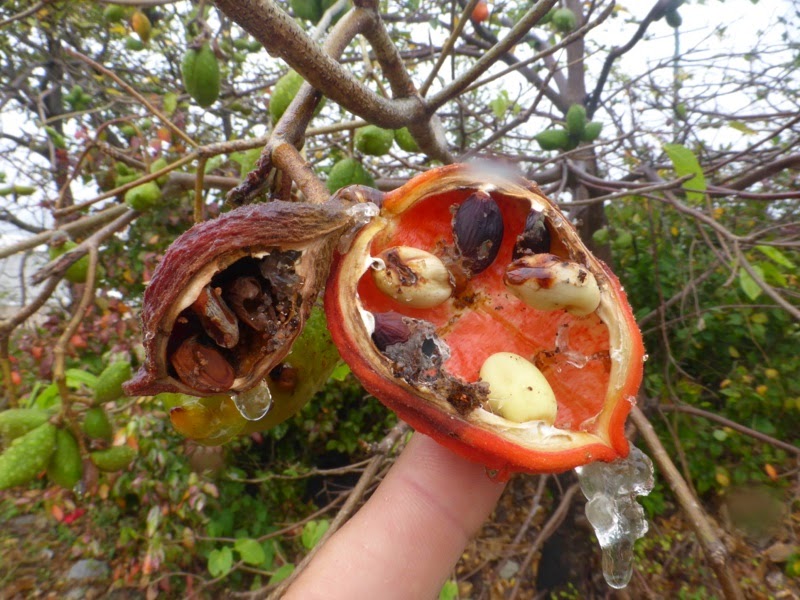From Becc's, our Warm Showers host in Townsville, we walked out to explore some of the town's significant sites.
We finally got to taste ripe bush passionfruit on the hill. Yum!
And we were newsworthy down on The Strand. The article neighbouring ours is fairly amusing. It features a male, Jones, 44 years old, involved with bikes; a description that matches Patrick...
While in Townsville we asked the Palm Island Council permission to visit their island. Palm has been a closed community until this year, but it's not open to tourists. Council filters those who come by asking them to state their intention. We told council about our free food project and the research we were doing and they kindly decided to sponsor us by offering a much reduced rate to stay in the council-run motel, the only accomadation for visitors on the island. We still had a few days to wait for the next ferry and were lucky enough to stay with more Warm Showers hosts, Mick and Jen. Mick runs The Bicycle Pedlar shop in Townsville, specialising in touring. He gave Patrick's bike a good going over. Thanks Mick!
On the first night Jen cooked us all a beautiful curry. Thanks Jen! So we reciprocated on the second, beginning the meal with a haul of foraged passionfruit we found at a nearby abandoned house site.
We thanked and farewelled Jen and Mick and boarded the ferry for Palm Island, otherwise known by its Aboriginal name Bwgcolman, meaning many tribes, one people.
Palm, as the locals call it, was like stepping into another country.
One of the most joyous things we soon discovered was all the free-ranging going on. Quite a contrast to surbanite Australia. On Palm, horses,
dogs,
goats,
and children have free range of the island.
It was a beautiful thing, and so too were all the foods we discovered. Over the week we were there we compiled a list of 60 autonomous edibles we found or locals told us exist on the island. Bush cucumber grows along the beaches,
as do tropical almonds,
peanut trees,
native gooseberries,
and coconuts.
The local kids were very knowledgeable about fishing,
hunting,
and having a good time.
So we followed their lead. Zero mixed it with Big Girl and Mango,
Meg fished for Burracuda,
Patrick for mullet,
and Woody foraged Burdekin plums and cluster figs.
Each day we found more and more species of both traditional bush tucker and newcomers. We met Uncle Nick and he took us out foraging.
He showed us a number of plants including this weed, possibly a spurge, which is good for treating worts,
and these ripe emu berries.
By the end of the week we had discovered living on or around the island the following species: mango, chinee apple, banana, bush banana, African tulip tree, bush lemon, amaranth, coconut, barracuda, barramundi cod, sea turtle, bush passionfruit, snakeweed, snapper, trevally, brush turkey, echidna, possum, Burdekin plum, bush cucumber, cluster fig, autonomous goat, queenfish, clam, native mulberry, rock wallaby, mud mussel, spider shell, crab, pipi, cassava, sweet potato, naturalised squash, mangrove snail, mud whelk, stingray, sea caper, beach cherry, autonomous pig, jackfruit, emu berry, Pacific rosewood, lady apple, fleabane, goats foot, dugong, grasshopper, naturalised tomato, green ant, guava, mullet, nardoo, native gooseberry, native rock fig, pandanus, paw paw, peanut or monkey nut tree, mackerel, purslane, oyster, emu berry and tropical almond.
The green fruit of the tropical or beach almond looks like this:
During the week Patrick wrote a paper for the forthcoming Indigenous Men's Health Conference in Cairns. His paper is called Future food, future health: Remodelling tradional Indigenous food and lifeways. For those wishing to delve into more detail of our time on Palm Island and his thesis of walked-for food, you can read his draft.
Later in the week we also got to hang out with these two lovely peeps, Yo and Jarrod,
who are involved with Kinfolk in Melbourne, a café whose sole purpose is to generate funds to support goodly things. They were on Palm with one such enterprise, the Cathy Freeman Foundation, which is set up to assist Indigenous kids education. While on Palm Artist as Family considered ways to help improve non-Indigenous kids education around Australia, to 'close the gap' so to speak, with the lack of knowledge in free-ranging, foraging, fishing, hunting and general life resilience. Palm kids were simply awesome and each afternoon fishing off the jetty we met a great number of them and shared our stories and knowledge.
Many outsiders consider Palm Island a third world country and focus on the negatives well publicised in the media. But to us this island represents a frontier, and much is to be learnt from Bwgcolman people as we move into an energy descent era. Resilient kids are certainly the future, as are Indigenous knowledges.
Palm has been a such a highlight in our journey. Thank you to all on the island for sharing your stories, skills and knowledges. It has been a wonderful learning for us.































"Artist as Family considered ways to help improve non-Indigenous kids education around Australia, to 'close the gap' so to speak, with the lack of knowledge in free-ranging, foraging, fishing, hunting and general life resilience".
ReplyDeleteYes! Closing the gap can certainly go both ways.
I really enjoy your missives from the road, thanks for sharing them.
Thanks for saying so Nicky, and yes it certainly does go both ways. Our kids need to be free-ranging more and less under the wings of helicopter parenting.
DeleteGoodness, that certainly is an island of plenty. Cant wait for the next post.
ReplyDeleteIt certainly is Lynda, we're very sad to have left. We're taking it slow on our next leg north.
DeleteStill heading north? How far you think you'll go?
ReplyDeleteYes, we're heading for Cape Tribulation! Just climbed over the little zbump that was the Cardwell Ranges today.
Delete